BUSM4588 - Analysing HRM's Influence on Organisational Effectiveness
VerifiedAdded on 2023/06/12
|8
|2990
|198
Essay
AI Summary
This essay examines the impact of Human Resource Management (HRM) on an organization's effectiveness, utilizing the Australian Human Resource Institute (AHRI) Model of Excellence. It discusses HRM practices, procedures, and strategies, including employee development and talent management, while considering ethics and employee relations. The essay provides examples of both effective and ineffective HRM, highlighting how HRM can contribute to an organization's success through talent management, strategic alignment, and positive workplace culture, as well as how it can hinder effectiveness through ethical breaches, legal non-compliance, and inadequate management practices. The analysis concludes by emphasizing the critical balance HRM must strike to ensure organizational success, particularly in managing human capital and adapting to changing business environments.
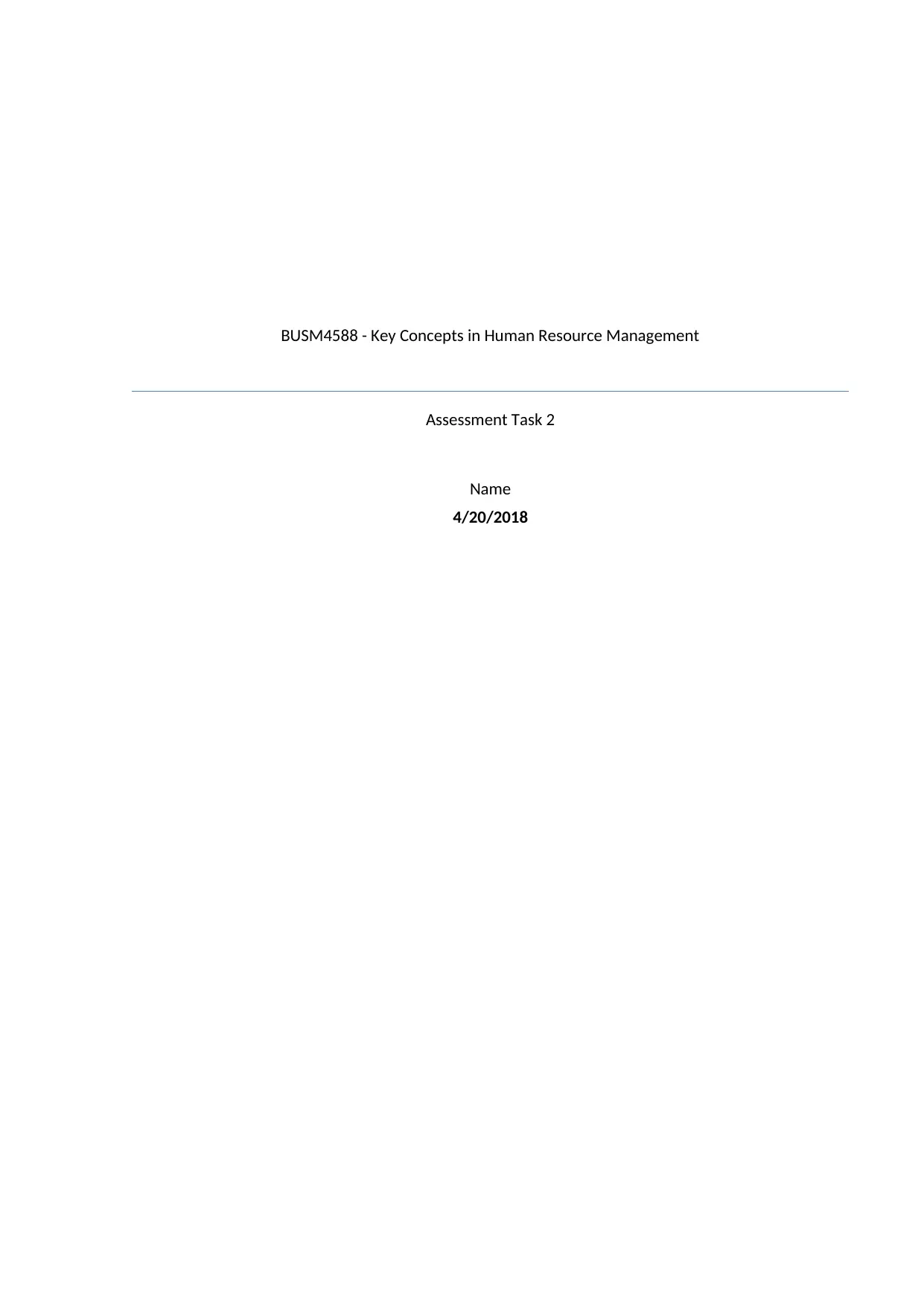
BUSM4588 - Key Concepts in Human Resource Management
Assessment Task 2
Name
4/20/2018
Assessment Task 2
Name
4/20/2018
Paraphrase This Document
Need a fresh take? Get an instant paraphrase of this document with our AI Paraphraser
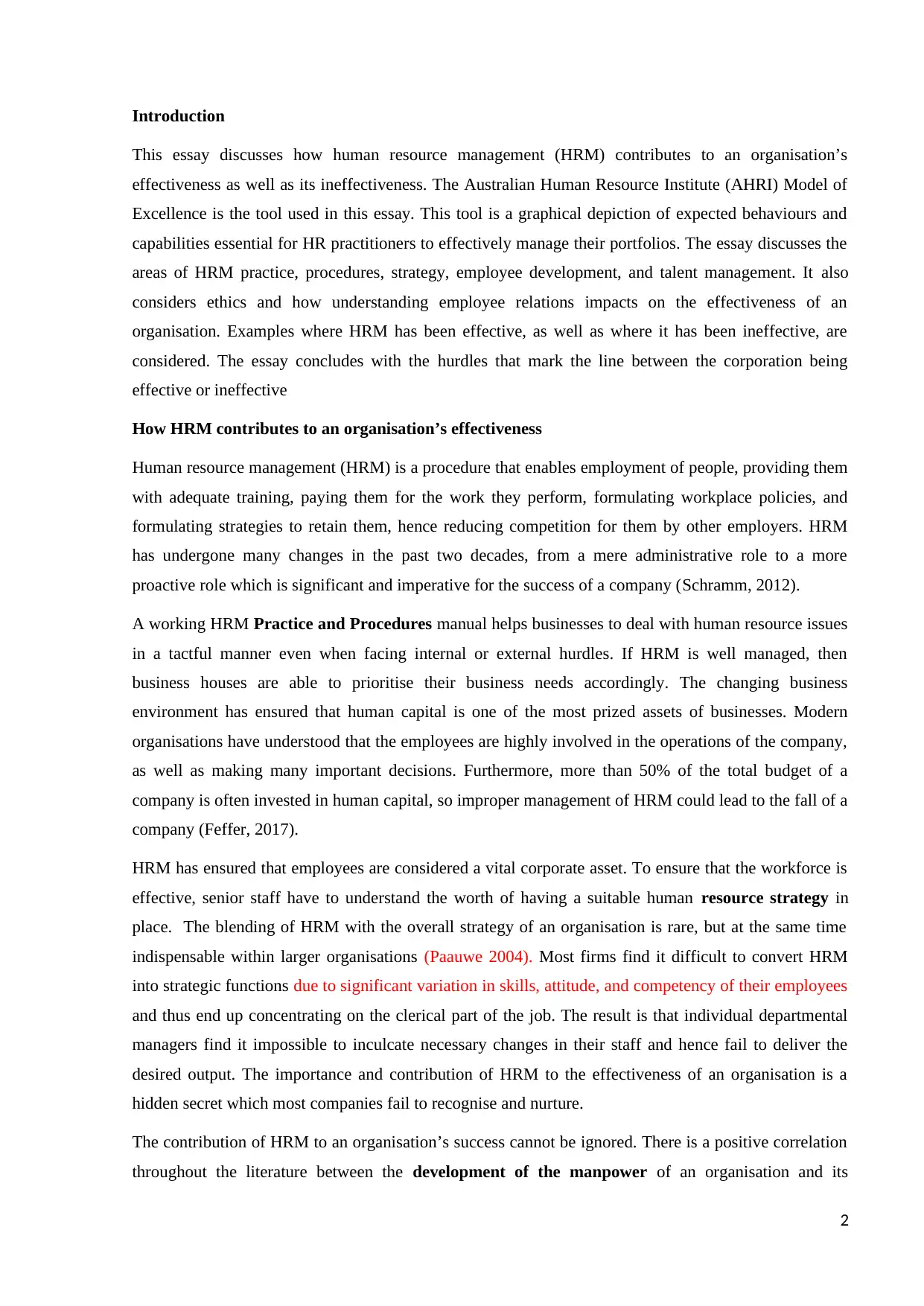
Introduction
This essay discusses how human resource management (HRM) contributes to an organisation’s
effectiveness as well as its ineffectiveness. The Australian Human Resource Institute (AHRI) Model of
Excellence is the tool used in this essay. This tool is a graphical depiction of expected behaviours and
capabilities essential for HR practitioners to effectively manage their portfolios. The essay discusses the
areas of HRM practice, procedures, strategy, employee development, and talent management. It also
considers ethics and how understanding employee relations impacts on the effectiveness of an
organisation. Examples where HRM has been effective, as well as where it has been ineffective, are
considered. The essay concludes with the hurdles that mark the line between the corporation being
effective or ineffective
How HRM contributes to an organisation’s effectiveness
Human resource management (HRM) is a procedure that enables employment of people, providing them
with adequate training, paying them for the work they perform, formulating workplace policies, and
formulating strategies to retain them, hence reducing competition for them by other employers. HRM
has undergone many changes in the past two decades, from a mere administrative role to a more
proactive role which is significant and imperative for the success of a company (Schramm, 2012).
A working HRM Practice and Procedures manual helps businesses to deal with human resource issues
in a tactful manner even when facing internal or external hurdles. If HRM is well managed, then
business houses are able to prioritise their business needs accordingly. The changing business
environment has ensured that human capital is one of the most prized assets of businesses. Modern
organisations have understood that the employees are highly involved in the operations of the company,
as well as making many important decisions. Furthermore, more than 50% of the total budget of a
company is often invested in human capital, so improper management of HRM could lead to the fall of a
company (Feffer, 2017).
HRM has ensured that employees are considered a vital corporate asset. To ensure that the workforce is
effective, senior staff have to understand the worth of having a suitable human resource strategy in
place. The blending of HRM with the overall strategy of an organisation is rare, but at the same time
indispensable within larger organisations (Paauwe 2004). Most firms find it difficult to convert HRM
into strategic functions due to significant variation in skills, attitude, and competency of their employees
and thus end up concentrating on the clerical part of the job. The result is that individual departmental
managers find it impossible to inculcate necessary changes in their staff and hence fail to deliver the
desired output. The importance and contribution of HRM to the effectiveness of an organisation is a
hidden secret which most companies fail to recognise and nurture.
The contribution of HRM to an organisation’s success cannot be ignored. There is a positive correlation
throughout the literature between the development of the manpower of an organisation and its
2
This essay discusses how human resource management (HRM) contributes to an organisation’s
effectiveness as well as its ineffectiveness. The Australian Human Resource Institute (AHRI) Model of
Excellence is the tool used in this essay. This tool is a graphical depiction of expected behaviours and
capabilities essential for HR practitioners to effectively manage their portfolios. The essay discusses the
areas of HRM practice, procedures, strategy, employee development, and talent management. It also
considers ethics and how understanding employee relations impacts on the effectiveness of an
organisation. Examples where HRM has been effective, as well as where it has been ineffective, are
considered. The essay concludes with the hurdles that mark the line between the corporation being
effective or ineffective
How HRM contributes to an organisation’s effectiveness
Human resource management (HRM) is a procedure that enables employment of people, providing them
with adequate training, paying them for the work they perform, formulating workplace policies, and
formulating strategies to retain them, hence reducing competition for them by other employers. HRM
has undergone many changes in the past two decades, from a mere administrative role to a more
proactive role which is significant and imperative for the success of a company (Schramm, 2012).
A working HRM Practice and Procedures manual helps businesses to deal with human resource issues
in a tactful manner even when facing internal or external hurdles. If HRM is well managed, then
business houses are able to prioritise their business needs accordingly. The changing business
environment has ensured that human capital is one of the most prized assets of businesses. Modern
organisations have understood that the employees are highly involved in the operations of the company,
as well as making many important decisions. Furthermore, more than 50% of the total budget of a
company is often invested in human capital, so improper management of HRM could lead to the fall of a
company (Feffer, 2017).
HRM has ensured that employees are considered a vital corporate asset. To ensure that the workforce is
effective, senior staff have to understand the worth of having a suitable human resource strategy in
place. The blending of HRM with the overall strategy of an organisation is rare, but at the same time
indispensable within larger organisations (Paauwe 2004). Most firms find it difficult to convert HRM
into strategic functions due to significant variation in skills, attitude, and competency of their employees
and thus end up concentrating on the clerical part of the job. The result is that individual departmental
managers find it impossible to inculcate necessary changes in their staff and hence fail to deliver the
desired output. The importance and contribution of HRM to the effectiveness of an organisation is a
hidden secret which most companies fail to recognise and nurture.
The contribution of HRM to an organisation’s success cannot be ignored. There is a positive correlation
throughout the literature between the development of the manpower of an organisation and its
2
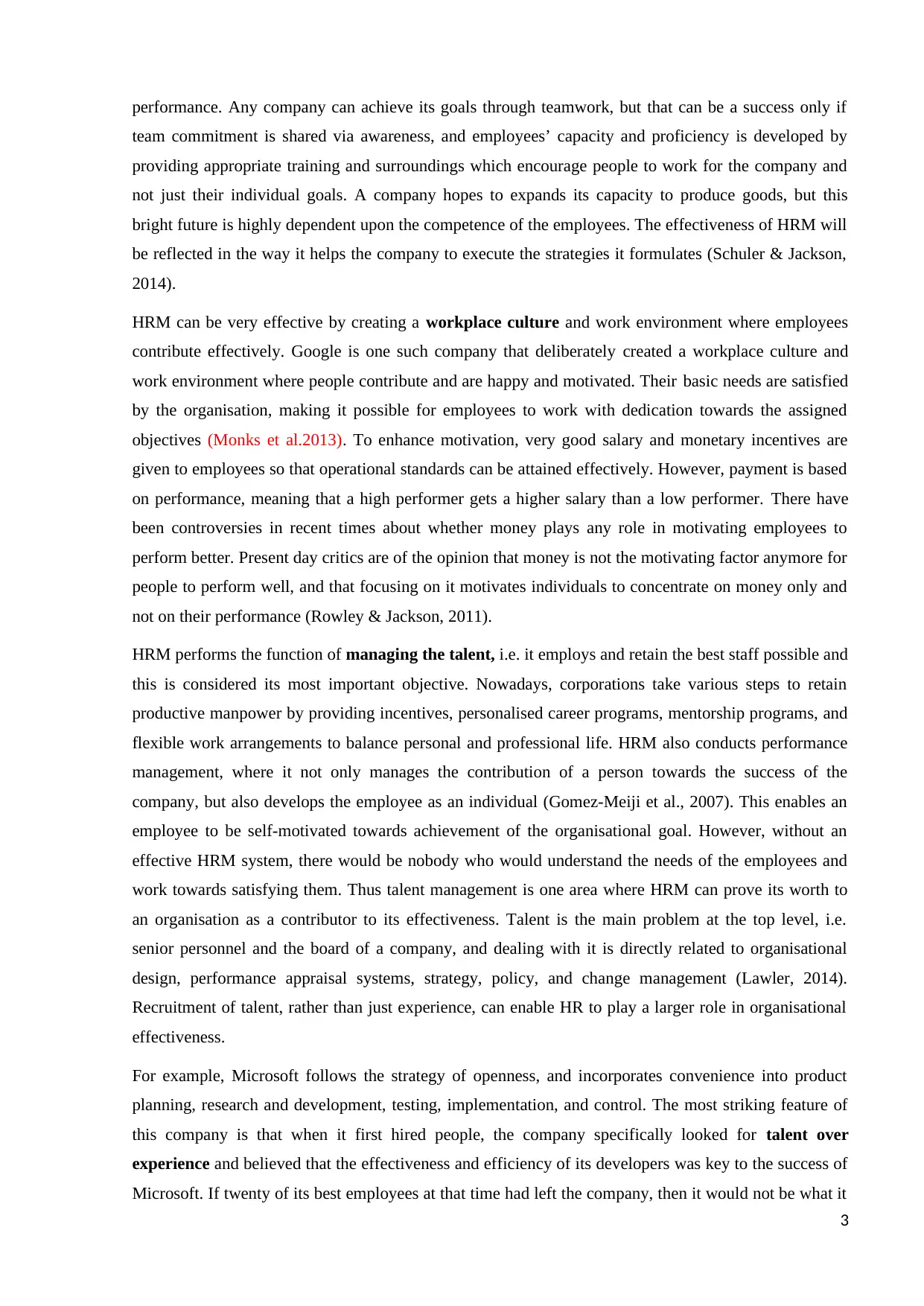
performance. Any company can achieve its goals through teamwork, but that can be a success only if
team commitment is shared via awareness, and employees’ capacity and proficiency is developed by
providing appropriate training and surroundings which encourage people to work for the company and
not just their individual goals. A company hopes to expands its capacity to produce goods, but this
bright future is highly dependent upon the competence of the employees. The effectiveness of HRM will
be reflected in the way it helps the company to execute the strategies it formulates (Schuler & Jackson,
2014).
HRM can be very effective by creating a workplace culture and work environment where employees
contribute effectively. Google is one such company that deliberately created a workplace culture and
work environment where people contribute and are happy and motivated. Their basic needs are satisfied
by the organisation, making it possible for employees to work with dedication towards the assigned
objectives (Monks et al.2013). To enhance motivation, very good salary and monetary incentives are
given to employees so that operational standards can be attained effectively. However, payment is based
on performance, meaning that a high performer gets a higher salary than a low performer. There have
been controversies in recent times about whether money plays any role in motivating employees to
perform better. Present day critics are of the opinion that money is not the motivating factor anymore for
people to perform well, and that focusing on it motivates individuals to concentrate on money only and
not on their performance (Rowley & Jackson, 2011).
HRM performs the function of managing the talent, i.e. it employs and retain the best staff possible and
this is considered its most important objective. Nowadays, corporations take various steps to retain
productive manpower by providing incentives, personalised career programs, mentorship programs, and
flexible work arrangements to balance personal and professional life. HRM also conducts performance
management, where it not only manages the contribution of a person towards the success of the
company, but also develops the employee as an individual (Gomez-Meiji et al., 2007). This enables an
employee to be self-motivated towards achievement of the organisational goal. However, without an
effective HRM system, there would be nobody who would understand the needs of the employees and
work towards satisfying them. Thus talent management is one area where HRM can prove its worth to
an organisation as a contributor to its effectiveness. Talent is the main problem at the top level, i.e.
senior personnel and the board of a company, and dealing with it is directly related to organisational
design, performance appraisal systems, strategy, policy, and change management (Lawler, 2014).
Recruitment of talent, rather than just experience, can enable HR to play a larger role in organisational
effectiveness.
For example, Microsoft follows the strategy of openness, and incorporates convenience into product
planning, research and development, testing, implementation, and control. The most striking feature of
this company is that when it first hired people, the company specifically looked for talent over
experience and believed that the effectiveness and efficiency of its developers was key to the success of
Microsoft. If twenty of its best employees at that time had left the company, then it would not be what it
3
team commitment is shared via awareness, and employees’ capacity and proficiency is developed by
providing appropriate training and surroundings which encourage people to work for the company and
not just their individual goals. A company hopes to expands its capacity to produce goods, but this
bright future is highly dependent upon the competence of the employees. The effectiveness of HRM will
be reflected in the way it helps the company to execute the strategies it formulates (Schuler & Jackson,
2014).
HRM can be very effective by creating a workplace culture and work environment where employees
contribute effectively. Google is one such company that deliberately created a workplace culture and
work environment where people contribute and are happy and motivated. Their basic needs are satisfied
by the organisation, making it possible for employees to work with dedication towards the assigned
objectives (Monks et al.2013). To enhance motivation, very good salary and monetary incentives are
given to employees so that operational standards can be attained effectively. However, payment is based
on performance, meaning that a high performer gets a higher salary than a low performer. There have
been controversies in recent times about whether money plays any role in motivating employees to
perform better. Present day critics are of the opinion that money is not the motivating factor anymore for
people to perform well, and that focusing on it motivates individuals to concentrate on money only and
not on their performance (Rowley & Jackson, 2011).
HRM performs the function of managing the talent, i.e. it employs and retain the best staff possible and
this is considered its most important objective. Nowadays, corporations take various steps to retain
productive manpower by providing incentives, personalised career programs, mentorship programs, and
flexible work arrangements to balance personal and professional life. HRM also conducts performance
management, where it not only manages the contribution of a person towards the success of the
company, but also develops the employee as an individual (Gomez-Meiji et al., 2007). This enables an
employee to be self-motivated towards achievement of the organisational goal. However, without an
effective HRM system, there would be nobody who would understand the needs of the employees and
work towards satisfying them. Thus talent management is one area where HRM can prove its worth to
an organisation as a contributor to its effectiveness. Talent is the main problem at the top level, i.e.
senior personnel and the board of a company, and dealing with it is directly related to organisational
design, performance appraisal systems, strategy, policy, and change management (Lawler, 2014).
Recruitment of talent, rather than just experience, can enable HR to play a larger role in organisational
effectiveness.
For example, Microsoft follows the strategy of openness, and incorporates convenience into product
planning, research and development, testing, implementation, and control. The most striking feature of
this company is that when it first hired people, the company specifically looked for talent over
experience and believed that the effectiveness and efficiency of its developers was key to the success of
Microsoft. If twenty of its best employees at that time had left the company, then it would not be what it
3
⊘ This is a preview!⊘
Do you want full access?
Subscribe today to unlock all pages.

Trusted by 1+ million students worldwide
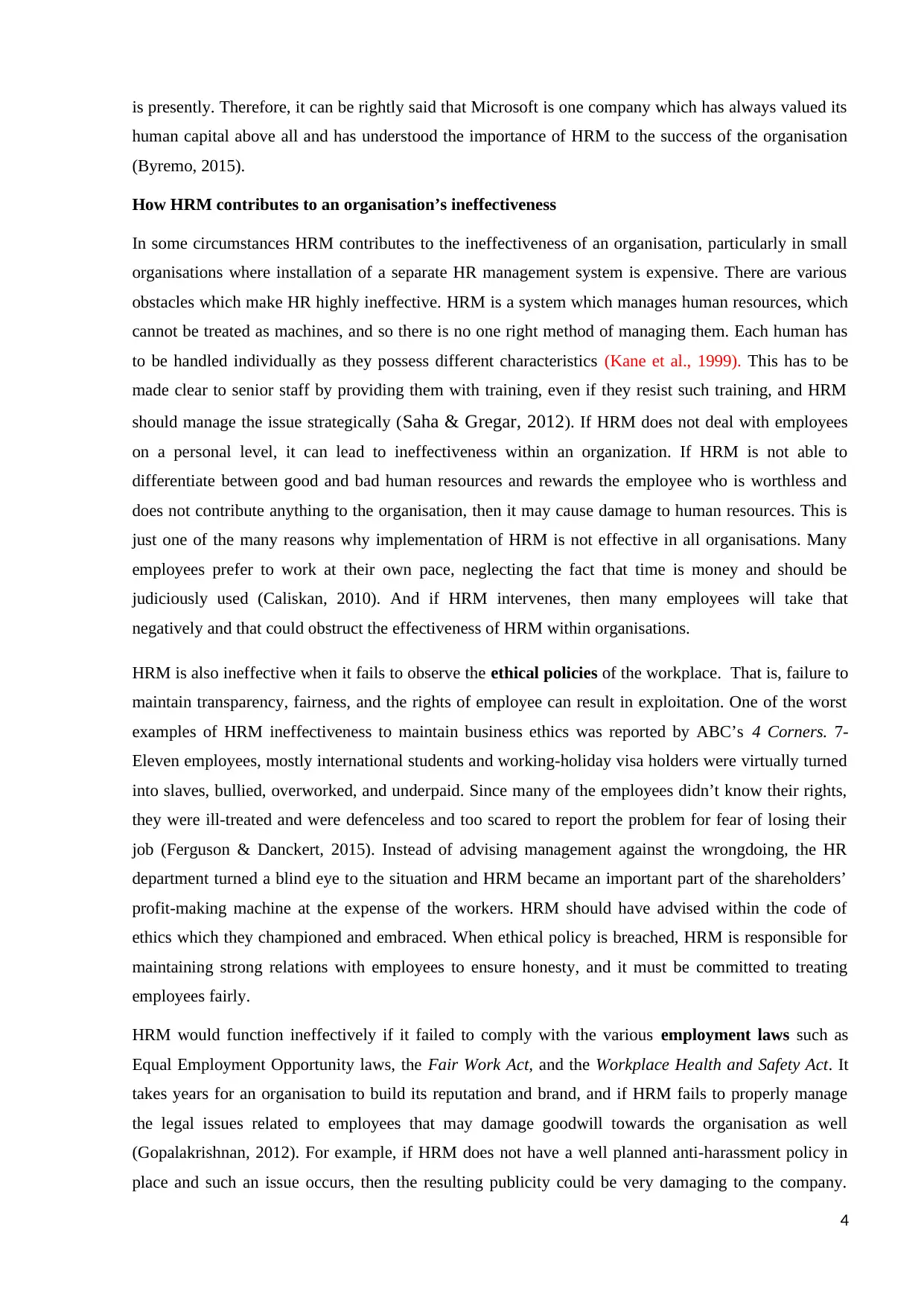
is presently. Therefore, it can be rightly said that Microsoft is one company which has always valued its
human capital above all and has understood the importance of HRM to the success of the organisation
(Byremo, 2015).
How HRM contributes to an organisation’s ineffectiveness
In some circumstances HRM contributes to the ineffectiveness of an organisation, particularly in small
organisations where installation of a separate HR management system is expensive. There are various
obstacles which make HR highly ineffective. HRM is a system which manages human resources, which
cannot be treated as machines, and so there is no one right method of managing them. Each human has
to be handled individually as they possess different characteristics (Kane et al., 1999). This has to be
made clear to senior staff by providing them with training, even if they resist such training, and HRM
should manage the issue strategically (Saha & Gregar, 2012). If HRM does not deal with employees
on a personal level, it can lead to ineffectiveness within an organization. If HRM is not able to
differentiate between good and bad human resources and rewards the employee who is worthless and
does not contribute anything to the organisation, then it may cause damage to human resources. This is
just one of the many reasons why implementation of HRM is not effective in all organisations. Many
employees prefer to work at their own pace, neglecting the fact that time is money and should be
judiciously used (Caliskan, 2010). And if HRM intervenes, then many employees will take that
negatively and that could obstruct the effectiveness of HRM within organisations.
HRM is also ineffective when it fails to observe the ethical policies of the workplace. That is, failure to
maintain transparency, fairness, and the rights of employee can result in exploitation. One of the worst
examples of HRM ineffectiveness to maintain business ethics was reported by ABC’s 4 Corners. 7-
Eleven employees, mostly international students and working-holiday visa holders were virtually turned
into slaves, bullied, overworked, and underpaid. Since many of the employees didn’t know their rights,
they were ill-treated and were defenceless and too scared to report the problem for fear of losing their
job (Ferguson & Danckert, 2015). Instead of advising management against the wrongdoing, the HR
department turned a blind eye to the situation and HRM became an important part of the shareholders’
profit-making machine at the expense of the workers. HRM should have advised within the code of
ethics which they championed and embraced. When ethical policy is breached, HRM is responsible for
maintaining strong relations with employees to ensure honesty, and it must be committed to treating
employees fairly.
HRM would function ineffectively if it failed to comply with the various employment laws such as
Equal Employment Opportunity laws, the Fair Work Act, and the Workplace Health and Safety Act. It
takes years for an organisation to build its reputation and brand, and if HRM fails to properly manage
the legal issues related to employees that may damage goodwill towards the organisation as well
(Gopalakrishnan, 2012). For example, if HRM does not have a well planned anti-harassment policy in
place and such an issue occurs, then the resulting publicity could be very damaging to the company.
4
human capital above all and has understood the importance of HRM to the success of the organisation
(Byremo, 2015).
How HRM contributes to an organisation’s ineffectiveness
In some circumstances HRM contributes to the ineffectiveness of an organisation, particularly in small
organisations where installation of a separate HR management system is expensive. There are various
obstacles which make HR highly ineffective. HRM is a system which manages human resources, which
cannot be treated as machines, and so there is no one right method of managing them. Each human has
to be handled individually as they possess different characteristics (Kane et al., 1999). This has to be
made clear to senior staff by providing them with training, even if they resist such training, and HRM
should manage the issue strategically (Saha & Gregar, 2012). If HRM does not deal with employees
on a personal level, it can lead to ineffectiveness within an organization. If HRM is not able to
differentiate between good and bad human resources and rewards the employee who is worthless and
does not contribute anything to the organisation, then it may cause damage to human resources. This is
just one of the many reasons why implementation of HRM is not effective in all organisations. Many
employees prefer to work at their own pace, neglecting the fact that time is money and should be
judiciously used (Caliskan, 2010). And if HRM intervenes, then many employees will take that
negatively and that could obstruct the effectiveness of HRM within organisations.
HRM is also ineffective when it fails to observe the ethical policies of the workplace. That is, failure to
maintain transparency, fairness, and the rights of employee can result in exploitation. One of the worst
examples of HRM ineffectiveness to maintain business ethics was reported by ABC’s 4 Corners. 7-
Eleven employees, mostly international students and working-holiday visa holders were virtually turned
into slaves, bullied, overworked, and underpaid. Since many of the employees didn’t know their rights,
they were ill-treated and were defenceless and too scared to report the problem for fear of losing their
job (Ferguson & Danckert, 2015). Instead of advising management against the wrongdoing, the HR
department turned a blind eye to the situation and HRM became an important part of the shareholders’
profit-making machine at the expense of the workers. HRM should have advised within the code of
ethics which they championed and embraced. When ethical policy is breached, HRM is responsible for
maintaining strong relations with employees to ensure honesty, and it must be committed to treating
employees fairly.
HRM would function ineffectively if it failed to comply with the various employment laws such as
Equal Employment Opportunity laws, the Fair Work Act, and the Workplace Health and Safety Act. It
takes years for an organisation to build its reputation and brand, and if HRM fails to properly manage
the legal issues related to employees that may damage goodwill towards the organisation as well
(Gopalakrishnan, 2012). For example, if HRM does not have a well planned anti-harassment policy in
place and such an issue occurs, then the resulting publicity could be very damaging to the company.
4
Paraphrase This Document
Need a fresh take? Get an instant paraphrase of this document with our AI Paraphraser
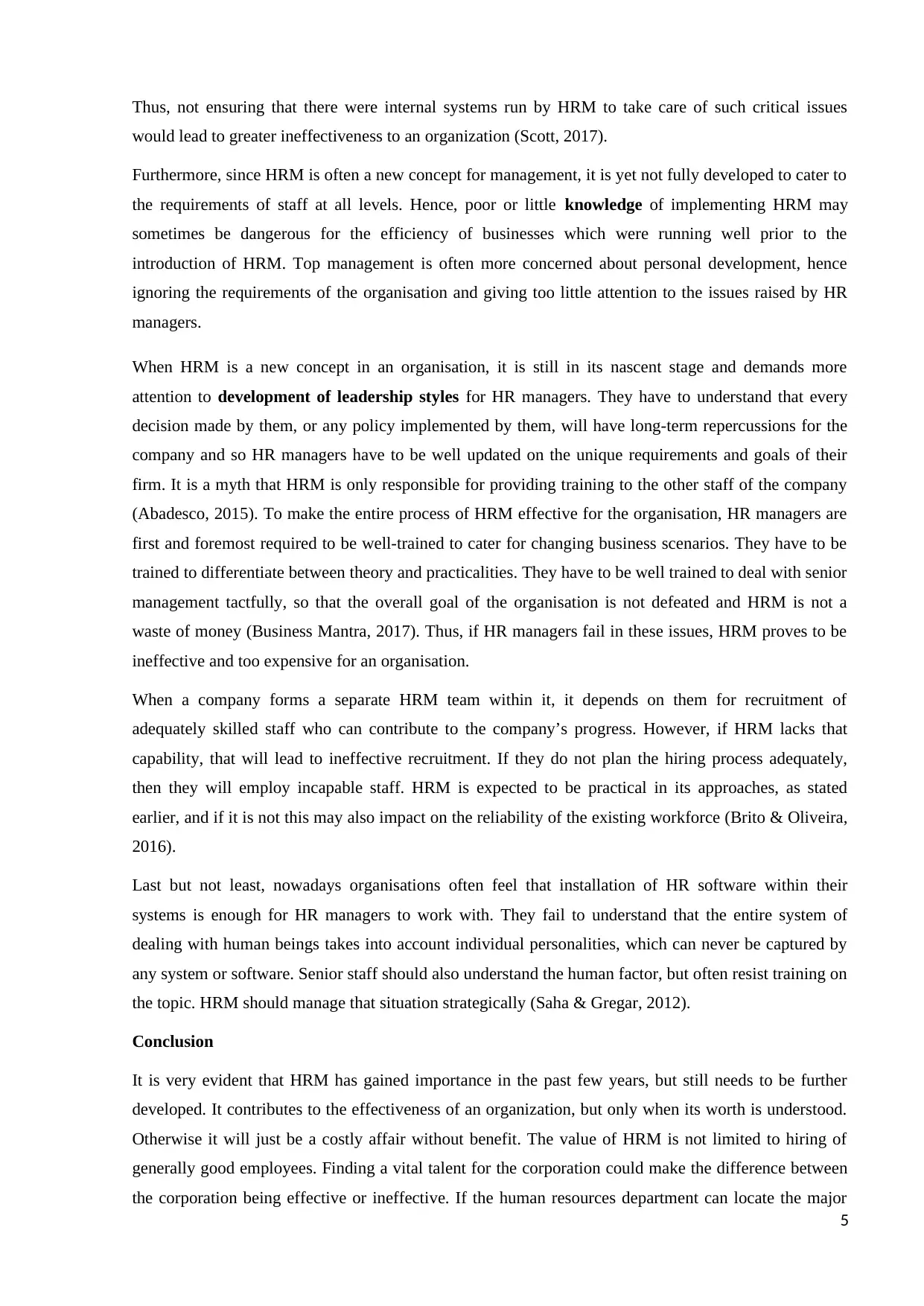
Thus, not ensuring that there were internal systems run by HRM to take care of such critical issues
would lead to greater ineffectiveness to an organization (Scott, 2017).
Furthermore, since HRM is often a new concept for management, it is yet not fully developed to cater to
the requirements of staff at all levels. Hence, poor or little knowledge of implementing HRM may
sometimes be dangerous for the efficiency of businesses which were running well prior to the
introduction of HRM. Top management is often more concerned about personal development, hence
ignoring the requirements of the organisation and giving too little attention to the issues raised by HR
managers.
When HRM is a new concept in an organisation, it is still in its nascent stage and demands more
attention to development of leadership styles for HR managers. They have to understand that every
decision made by them, or any policy implemented by them, will have long-term repercussions for the
company and so HR managers have to be well updated on the unique requirements and goals of their
firm. It is a myth that HRM is only responsible for providing training to the other staff of the company
(Abadesco, 2015). To make the entire process of HRM effective for the organisation, HR managers are
first and foremost required to be well-trained to cater for changing business scenarios. They have to be
trained to differentiate between theory and practicalities. They have to be well trained to deal with senior
management tactfully, so that the overall goal of the organisation is not defeated and HRM is not a
waste of money (Business Mantra, 2017). Thus, if HR managers fail in these issues, HRM proves to be
ineffective and too expensive for an organisation.
When a company forms a separate HRM team within it, it depends on them for recruitment of
adequately skilled staff who can contribute to the company’s progress. However, if HRM lacks that
capability, that will lead to ineffective recruitment. If they do not plan the hiring process adequately,
then they will employ incapable staff. HRM is expected to be practical in its approaches, as stated
earlier, and if it is not this may also impact on the reliability of the existing workforce (Brito & Oliveira,
2016).
Last but not least, nowadays organisations often feel that installation of HR software within their
systems is enough for HR managers to work with. They fail to understand that the entire system of
dealing with human beings takes into account individual personalities, which can never be captured by
any system or software. Senior staff should also understand the human factor, but often resist training on
the topic. HRM should manage that situation strategically (Saha & Gregar, 2012).
Conclusion
It is very evident that HRM has gained importance in the past few years, but still needs to be further
developed. It contributes to the effectiveness of an organization, but only when its worth is understood.
Otherwise it will just be a costly affair without benefit. The value of HRM is not limited to hiring of
generally good employees. Finding a vital talent for the corporation could make the difference between
the corporation being effective or ineffective. If the human resources department can locate the major
5
would lead to greater ineffectiveness to an organization (Scott, 2017).
Furthermore, since HRM is often a new concept for management, it is yet not fully developed to cater to
the requirements of staff at all levels. Hence, poor or little knowledge of implementing HRM may
sometimes be dangerous for the efficiency of businesses which were running well prior to the
introduction of HRM. Top management is often more concerned about personal development, hence
ignoring the requirements of the organisation and giving too little attention to the issues raised by HR
managers.
When HRM is a new concept in an organisation, it is still in its nascent stage and demands more
attention to development of leadership styles for HR managers. They have to understand that every
decision made by them, or any policy implemented by them, will have long-term repercussions for the
company and so HR managers have to be well updated on the unique requirements and goals of their
firm. It is a myth that HRM is only responsible for providing training to the other staff of the company
(Abadesco, 2015). To make the entire process of HRM effective for the organisation, HR managers are
first and foremost required to be well-trained to cater for changing business scenarios. They have to be
trained to differentiate between theory and practicalities. They have to be well trained to deal with senior
management tactfully, so that the overall goal of the organisation is not defeated and HRM is not a
waste of money (Business Mantra, 2017). Thus, if HR managers fail in these issues, HRM proves to be
ineffective and too expensive for an organisation.
When a company forms a separate HRM team within it, it depends on them for recruitment of
adequately skilled staff who can contribute to the company’s progress. However, if HRM lacks that
capability, that will lead to ineffective recruitment. If they do not plan the hiring process adequately,
then they will employ incapable staff. HRM is expected to be practical in its approaches, as stated
earlier, and if it is not this may also impact on the reliability of the existing workforce (Brito & Oliveira,
2016).
Last but not least, nowadays organisations often feel that installation of HR software within their
systems is enough for HR managers to work with. They fail to understand that the entire system of
dealing with human beings takes into account individual personalities, which can never be captured by
any system or software. Senior staff should also understand the human factor, but often resist training on
the topic. HRM should manage that situation strategically (Saha & Gregar, 2012).
Conclusion
It is very evident that HRM has gained importance in the past few years, but still needs to be further
developed. It contributes to the effectiveness of an organization, but only when its worth is understood.
Otherwise it will just be a costly affair without benefit. The value of HRM is not limited to hiring of
generally good employees. Finding a vital talent for the corporation could make the difference between
the corporation being effective or ineffective. If the human resources department can locate the major
5
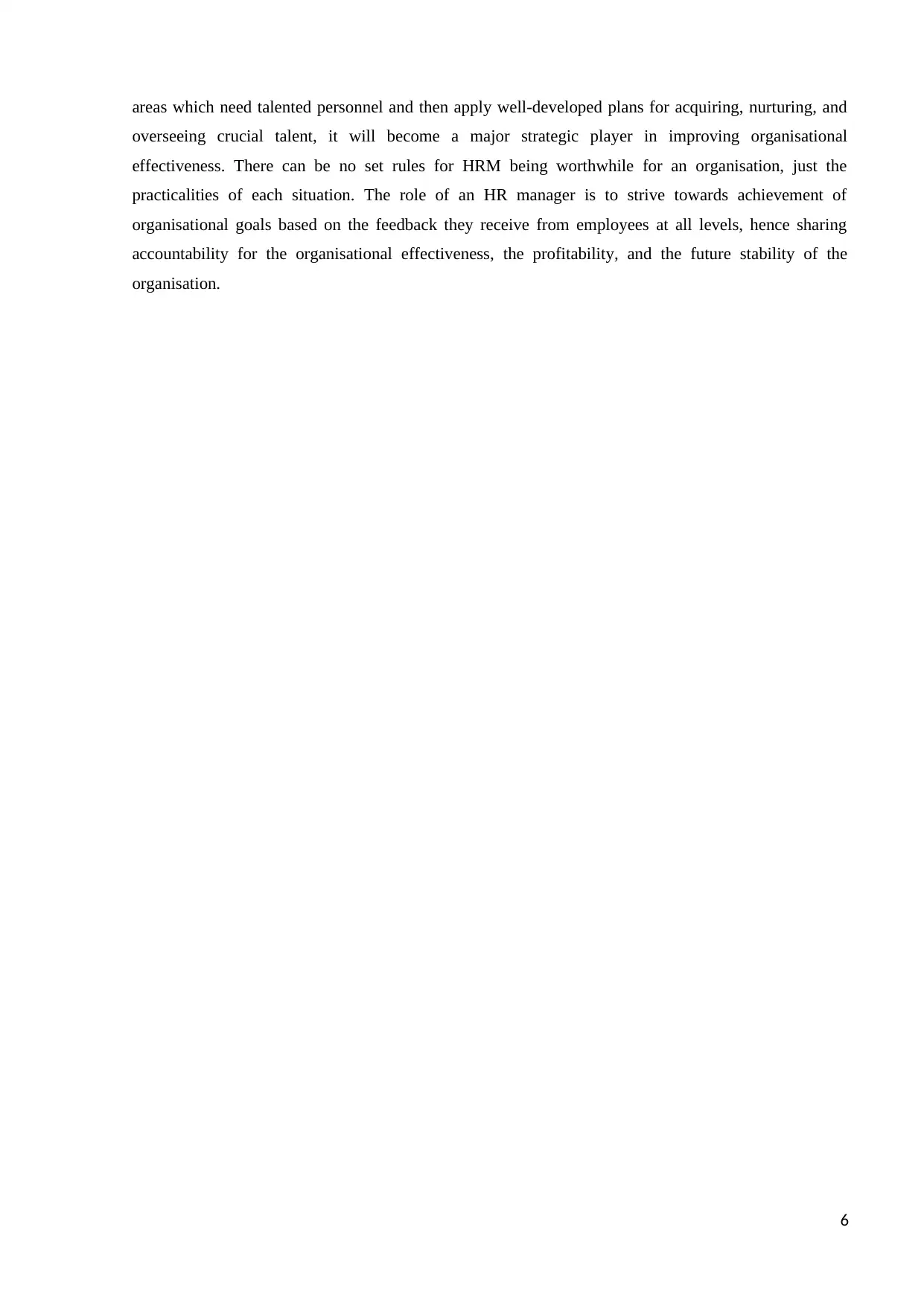
areas which need talented personnel and then apply well-developed plans for acquiring, nurturing, and
overseeing crucial talent, it will become a major strategic player in improving organisational
effectiveness. There can be no set rules for HRM being worthwhile for an organisation, just the
practicalities of each situation. The role of an HR manager is to strive towards achievement of
organisational goals based on the feedback they receive from employees at all levels, hence sharing
accountability for the organisational effectiveness, the profitability, and the future stability of the
organisation.
6
overseeing crucial talent, it will become a major strategic player in improving organisational
effectiveness. There can be no set rules for HRM being worthwhile for an organisation, just the
practicalities of each situation. The role of an HR manager is to strive towards achievement of
organisational goals based on the feedback they receive from employees at all levels, hence sharing
accountability for the organisational effectiveness, the profitability, and the future stability of the
organisation.
6
⊘ This is a preview!⊘
Do you want full access?
Subscribe today to unlock all pages.

Trusted by 1+ million students worldwide
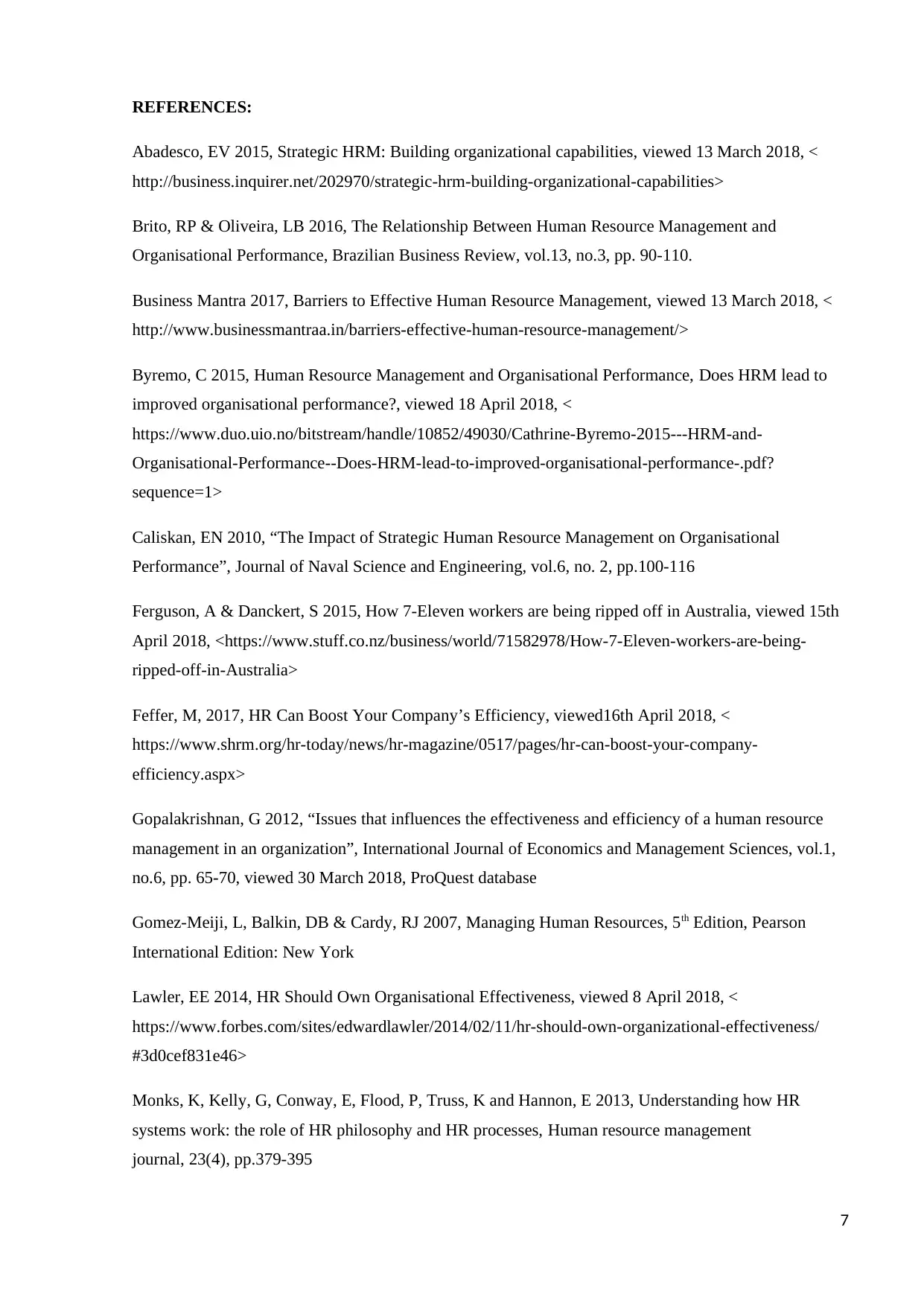
REFERENCES:
Abadesco, EV 2015, Strategic HRM: Building organizational capabilities, viewed 13 March 2018, <
http://business.inquirer.net/202970/strategic-hrm-building-organizational-capabilities>
Brito, RP & Oliveira, LB 2016, The Relationship Between Human Resource Management and
Organisational Performance, Brazilian Business Review, vol.13, no.3, pp. 90-110.
Business Mantra 2017, Barriers to Effective Human Resource Management, viewed 13 March 2018, <
http://www.businessmantraa.in/barriers-effective-human-resource-management/>
Byremo, C 2015, Human Resource Management and Organisational Performance, Does HRM lead to
improved organisational performance?, viewed 18 April 2018, <
https://www.duo.uio.no/bitstream/handle/10852/49030/Cathrine-Byremo-2015---HRM-and-
Organisational-Performance--Does-HRM-lead-to-improved-organisational-performance-.pdf?
sequence=1>
Caliskan, EN 2010, “The Impact of Strategic Human Resource Management on Organisational
Performance”, Journal of Naval Science and Engineering, vol.6, no. 2, pp.100-116
Ferguson, A & Danckert, S 2015, How 7-Eleven workers are being ripped off in Australia, viewed 15th
April 2018, <https://www.stuff.co.nz/business/world/71582978/How-7-Eleven-workers-are-being-
ripped-off-in-Australia>
Feffer, M, 2017, HR Can Boost Your Company’s Efficiency, viewed16th April 2018, <
https://www.shrm.org/hr-today/news/hr-magazine/0517/pages/hr-can-boost-your-company-
efficiency.aspx>
Gopalakrishnan, G 2012, “Issues that influences the effectiveness and efficiency of a human resource
management in an organization”, International Journal of Economics and Management Sciences, vol.1,
no.6, pp. 65-70, viewed 30 March 2018, ProQuest database
Gomez-Meiji, L, Balkin, DB & Cardy, RJ 2007, Managing Human Resources, 5th Edition, Pearson
International Edition: New York
Lawler, EE 2014, HR Should Own Organisational Effectiveness, viewed 8 April 2018, <
https://www.forbes.com/sites/edwardlawler/2014/02/11/hr-should-own-organizational-effectiveness/
#3d0cef831e46>
Monks, K, Kelly, G, Conway, E, Flood, P, Truss, K and Hannon, E 2013, Understanding how HR
systems work: the role of HR philosophy and HR processes, Human resource management
journal, 23(4), pp.379-395
7
Abadesco, EV 2015, Strategic HRM: Building organizational capabilities, viewed 13 March 2018, <
http://business.inquirer.net/202970/strategic-hrm-building-organizational-capabilities>
Brito, RP & Oliveira, LB 2016, The Relationship Between Human Resource Management and
Organisational Performance, Brazilian Business Review, vol.13, no.3, pp. 90-110.
Business Mantra 2017, Barriers to Effective Human Resource Management, viewed 13 March 2018, <
http://www.businessmantraa.in/barriers-effective-human-resource-management/>
Byremo, C 2015, Human Resource Management and Organisational Performance, Does HRM lead to
improved organisational performance?, viewed 18 April 2018, <
https://www.duo.uio.no/bitstream/handle/10852/49030/Cathrine-Byremo-2015---HRM-and-
Organisational-Performance--Does-HRM-lead-to-improved-organisational-performance-.pdf?
sequence=1>
Caliskan, EN 2010, “The Impact of Strategic Human Resource Management on Organisational
Performance”, Journal of Naval Science and Engineering, vol.6, no. 2, pp.100-116
Ferguson, A & Danckert, S 2015, How 7-Eleven workers are being ripped off in Australia, viewed 15th
April 2018, <https://www.stuff.co.nz/business/world/71582978/How-7-Eleven-workers-are-being-
ripped-off-in-Australia>
Feffer, M, 2017, HR Can Boost Your Company’s Efficiency, viewed16th April 2018, <
https://www.shrm.org/hr-today/news/hr-magazine/0517/pages/hr-can-boost-your-company-
efficiency.aspx>
Gopalakrishnan, G 2012, “Issues that influences the effectiveness and efficiency of a human resource
management in an organization”, International Journal of Economics and Management Sciences, vol.1,
no.6, pp. 65-70, viewed 30 March 2018, ProQuest database
Gomez-Meiji, L, Balkin, DB & Cardy, RJ 2007, Managing Human Resources, 5th Edition, Pearson
International Edition: New York
Lawler, EE 2014, HR Should Own Organisational Effectiveness, viewed 8 April 2018, <
https://www.forbes.com/sites/edwardlawler/2014/02/11/hr-should-own-organizational-effectiveness/
#3d0cef831e46>
Monks, K, Kelly, G, Conway, E, Flood, P, Truss, K and Hannon, E 2013, Understanding how HR
systems work: the role of HR philosophy and HR processes, Human resource management
journal, 23(4), pp.379-395
7
Paraphrase This Document
Need a fresh take? Get an instant paraphrase of this document with our AI Paraphraser
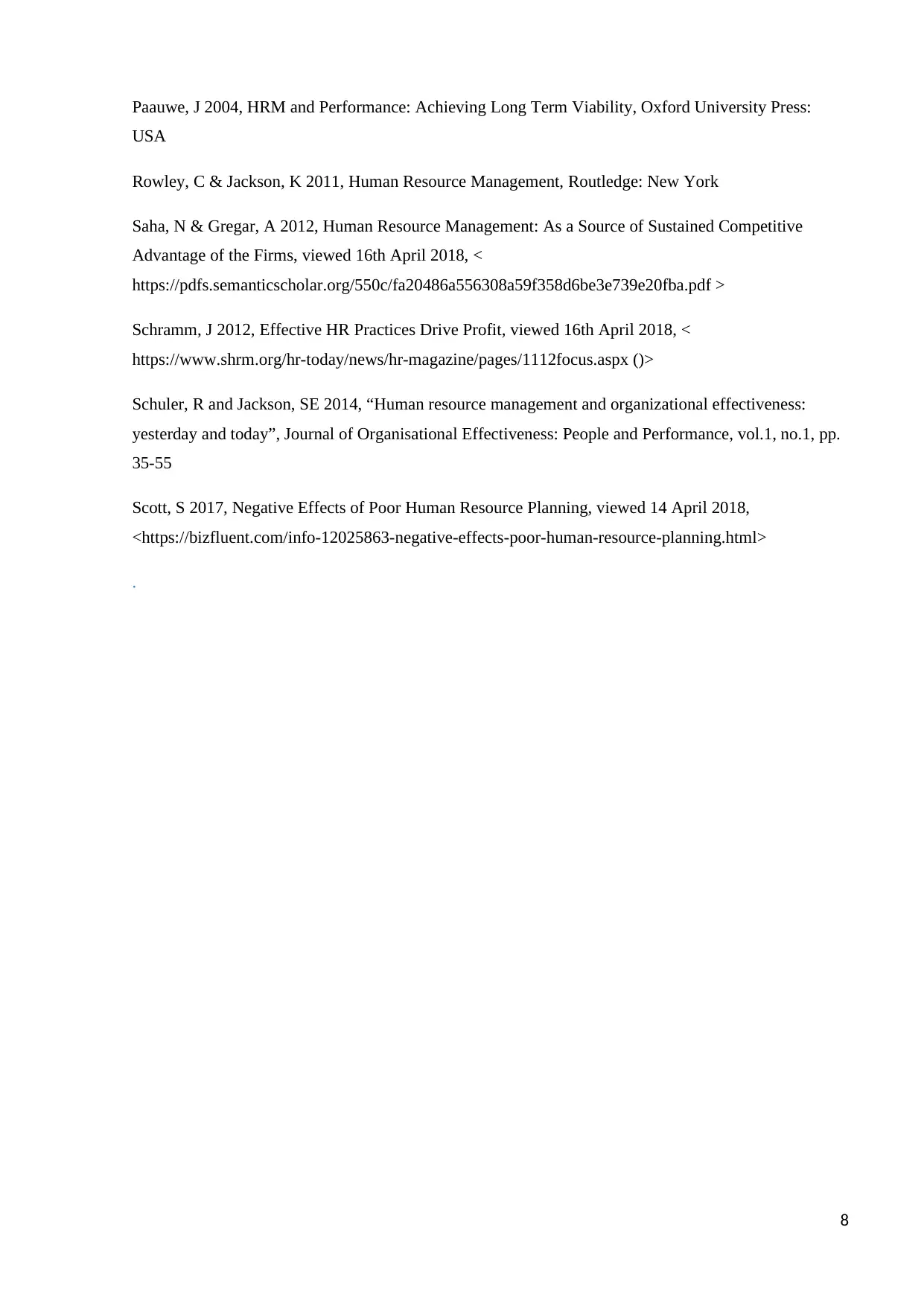
Paauwe, J 2004, HRM and Performance: Achieving Long Term Viability, Oxford University Press:
USA
Rowley, C & Jackson, K 2011, Human Resource Management, Routledge: New York
Saha, N & Gregar, A 2012, Human Resource Management: As a Source of Sustained Competitive
Advantage of the Firms, viewed 16th April 2018, <
https://pdfs.semanticscholar.org/550c/fa20486a556308a59f358d6be3e739e20fba.pdf >
Schramm, J 2012, Effective HR Practices Drive Profit, viewed 16th April 2018, <
https://www.shrm.org/hr-today/news/hr-magazine/pages/1112focus.aspx ()>
Schuler, R and Jackson, SE 2014, “Human resource management and organizational effectiveness:
yesterday and today”, Journal of Organisational Effectiveness: People and Performance, vol.1, no.1, pp.
35-55
Scott, S 2017, Negative Effects of Poor Human Resource Planning, viewed 14 April 2018,
<https://bizfluent.com/info-12025863-negative-effects-poor-human-resource-planning.html>
.
8
USA
Rowley, C & Jackson, K 2011, Human Resource Management, Routledge: New York
Saha, N & Gregar, A 2012, Human Resource Management: As a Source of Sustained Competitive
Advantage of the Firms, viewed 16th April 2018, <
https://pdfs.semanticscholar.org/550c/fa20486a556308a59f358d6be3e739e20fba.pdf >
Schramm, J 2012, Effective HR Practices Drive Profit, viewed 16th April 2018, <
https://www.shrm.org/hr-today/news/hr-magazine/pages/1112focus.aspx ()>
Schuler, R and Jackson, SE 2014, “Human resource management and organizational effectiveness:
yesterday and today”, Journal of Organisational Effectiveness: People and Performance, vol.1, no.1, pp.
35-55
Scott, S 2017, Negative Effects of Poor Human Resource Planning, viewed 14 April 2018,
<https://bizfluent.com/info-12025863-negative-effects-poor-human-resource-planning.html>
.
8
1 out of 8
Related Documents
Your All-in-One AI-Powered Toolkit for Academic Success.
+13062052269
info@desklib.com
Available 24*7 on WhatsApp / Email
![[object Object]](/_next/static/media/star-bottom.7253800d.svg)
Unlock your academic potential
Copyright © 2020–2026 A2Z Services. All Rights Reserved. Developed and managed by ZUCOL.





